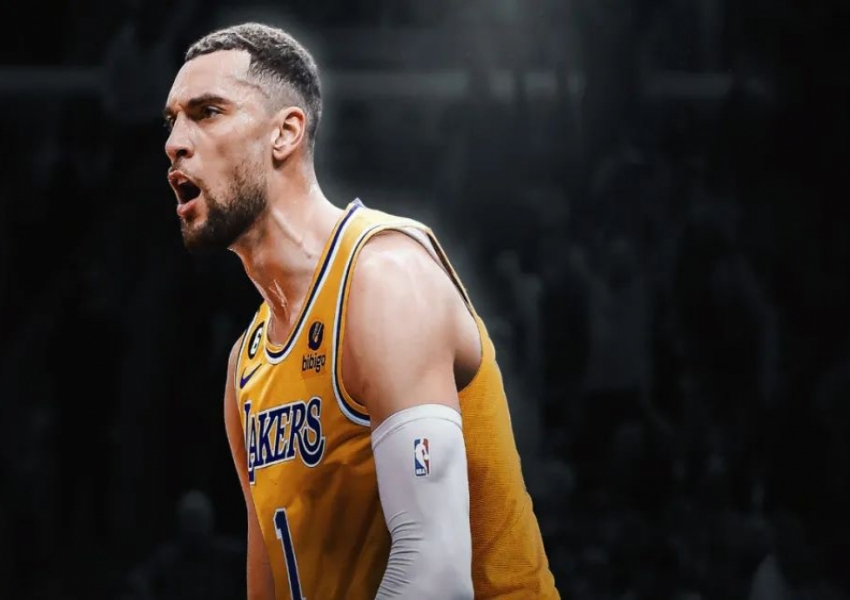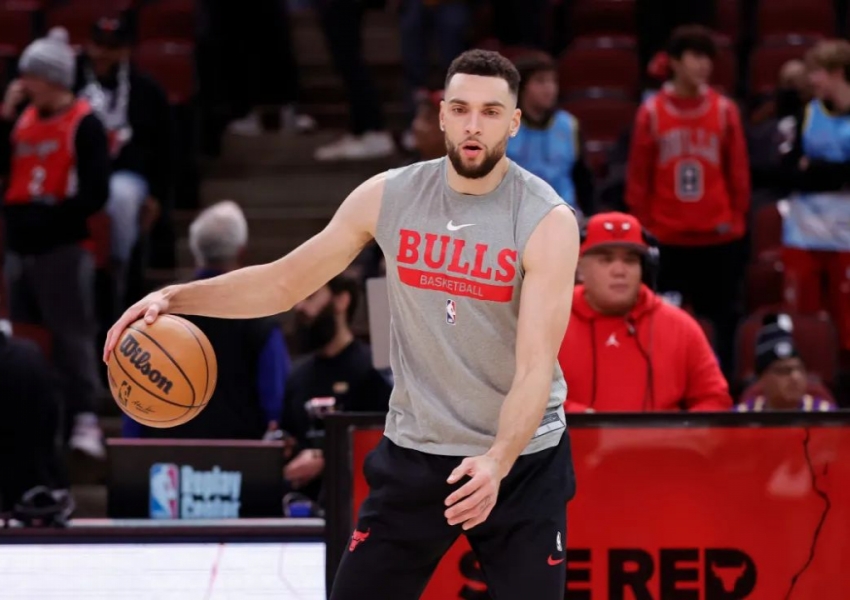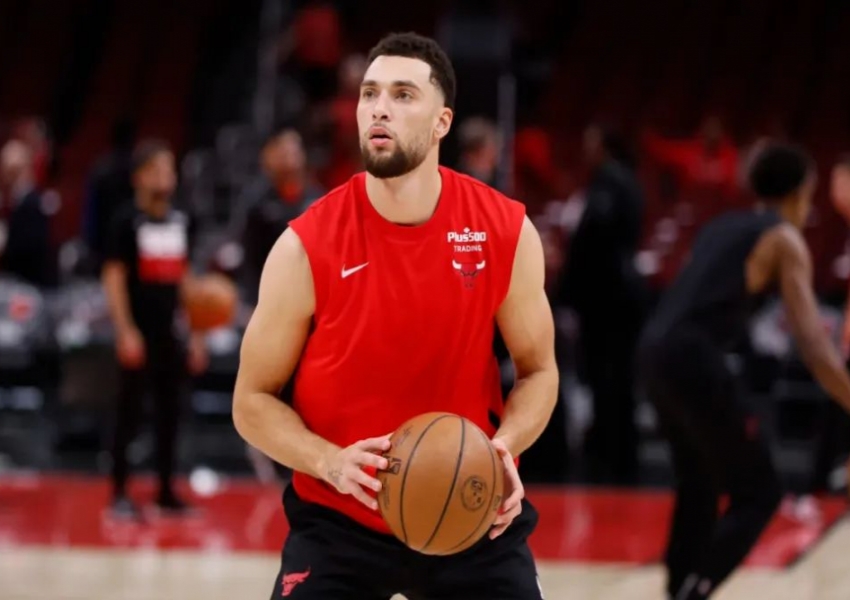Once a Two-Time All-Star, Now Unwanted by the Lakers: Why Is Zach LaVine’s Reputation in Decline?
Zach LaVine, a two-time NBA All-Star, was once considered one of the league's most promising young talents. His explosive athleticism, scoring ability, and highlight-reel dunks made him a fan favorite and a crucial piece for the Chicago Bulls. However, recent reports indicate that even a team like the Los Angeles Lakers, known for their aggressive pursuit of star talent, isn't showing much interest in acquiring LaVine. This begs the question: Why has LaVine's reputation taken such a hit?

LaVine’s journey to stardom wasn’t a fluke. His back-to-back All-Star selections in the 2020-21 and 2021-22 seasons were well-deserved. During the 2020-21 season, he averaged an impressive 27.4 points, 5.0 rebounds, and 4.9 assists per game. His shooting splits of 50.7% from the field, 41.9% from three, and 84.9% from the free-throw line translated to a true shooting percentage of 63.4%. The following season, despite a slight dip, LaVine still put up solid numbers with 24.4 points, 4.6 rebounds, and 4.5 assists per game, maintaining a true shooting percentage of 60.5%. These performances earned him a five-year, $215 million max contract from the Bulls.

However, this lucrative contract has become a point of contention. Before signing the max deal, LaVine was on a four-year, $80 million contract, which was considered a bargain given his All-Star performances. But with the jump in salary came heightened expectations. Unfortunately, LaVine’s first season after signing the max deal—2022-23—didn’t go as planned. He still averaged a respectable 24.8 points, 4.5 rebounds, and 4.2 assists per game with a true shooting percentage of 60.7%. But the Bulls’ overall poor performance meant LaVine didn’t make the All-Star team that year.

Then came the injuries. LaVine’s health has always been a concern, but it became a significant issue last season when he only played in 25 games. His scoring dropped to 19.5 points per game, his lowest since 2018, and his shooting percentages also took a hit, with a 45.2% field goal percentage and a 34.9% three-point percentage, both personal lows since 2018.
LaVine’s injury struggles allowed other players, such as Coby White, to step up. White’s production nearly doubled last season, going from 9.7 points per game to 19.1 points per game. White also had a positive impact on the Bulls when he was on the court. The team was only outscored by 0.7 points per 100 possessions with White on the floor, compared to 3.3 points per 100 possessions when he was off. In contrast, the Bulls were outscored by 5.4 points per 100 possessions with LaVine on the court, and only 0.6 points per 100 possessions when he was off.
Even in his best years, LaVine’s impact on the court has been questioned. During his second All-Star season, when the Bulls made the playoffs, LaVine’s presence on the court didn’t significantly impact the team’s net rating. The Bulls were outscored by 0.9 points per 100 possessions with LaVine playing and by 1.1 points per 100 possessions when he was on the bench. Comparatively, DeMar DeRozan, who was initially brought in to be LaVine’s second fiddle, had a more substantial impact. The Bulls had a positive net rating of 1.1 points per 100 possessions when DeRozan was on the court and were outscored by 4.8 points per 100 possessions when he was off.
LaVine’s struggles can be partly attributed to his playing style. He has dynamic athleticism and excels in fast breaks, but his half-court game is limited due to subpar ball-handling skills. He’s also a streaky shooter, meaning that while he can be incredibly hot, he can also go ice-cold, making him less reliable. Additionally, LaVine’s defense has never been a strong point. His defensive awareness and habits are questionable, and he can often be a liability on that end of the floor.
Despite these flaws, LaVine is still a talented player, capable of being a high-level second or third option on a championship-contending team. On paper, he seems like a perfect fit next to LeBron James and Anthony Davis on the Lakers. However, LaVine’s injury history and the high cost of acquiring him make the Lakers hesitant. LaVine has three years remaining on his contract, with salaries of $43.03 million, $45.99 million, and $48.97 million (player option). For context, one year of LaVine’s salary is equivalent to three years of Austin Reaves’ salary. Trading players like Reaves, Rui Hachimura, and Jarred Vanderbilt for LaVine would leave the Lakers with a “big three” and little else.
From the Lakers’ perspective, LaVine’s potential to complement LeBron and Davis is outweighed by the risk of his expensive contract and injury concerns. While LaVine has the talent to be a solid second or third option, his current situation, combined with his salary, makes him less appealing as a trade target.
LaVine’s situation with the Bulls remains uncertain. He still has the skills to be an All-Star-caliber player when healthy, but his stock is at a low point after a disappointing and injury-plagued season. If LaVine can return to form next season, especially with the expected changes in the Bulls’ roster, his trade value could rise again. Otherwise, the Bulls might be stuck with an expensive contract for a player who isn’t living up to expectations.
Copyright Statement:
Author: focusnba
Source: FocusNBA
The copyright of this article belongs to the author. Reproduction is not allowed without permission.
Recommended Blog
- Trade Rumors Swirl Around Former No. 1 Pick! Could the Lakers Offer a 3-for-1 Deal for NBA Finals-Caliber Center?
- A Bright Future for Choi Yongxi: Nets Trade Veterans, Clear Path for Young Talent to Shine in the NBA
- Chinese Basketball Association Officially Announced: Zhao Rui Takes on a Leadership Role Among CBA Players
- Giannis Joining Forces with Curry? Warriors’ Blockbuster Trade Proposal in the Works
- Official Signing! Dropped 41 and 37 Points! Once the Future of the Lakers...
- MVP, All-First Team, and a Championship! Why Can't Two-Time Slam Dunk Champion Mac McClung Make It in the NBA?
- Official Draft Announcement! The Next Chinese Basketball Star Aims for NBA – Zhao Weilin's Bold Decision
- Lakers Finally Make a Move! What Can Jordan Goodwin Bring to the Team?
- China Basketball Team's Buzzer-Beater Over Japan! Goodbye, Ding Yanyuhang—Another Forward on the Path to the NBA?
- A Rookie Calling Out Rudy Gobert! Is He Really That Bad?